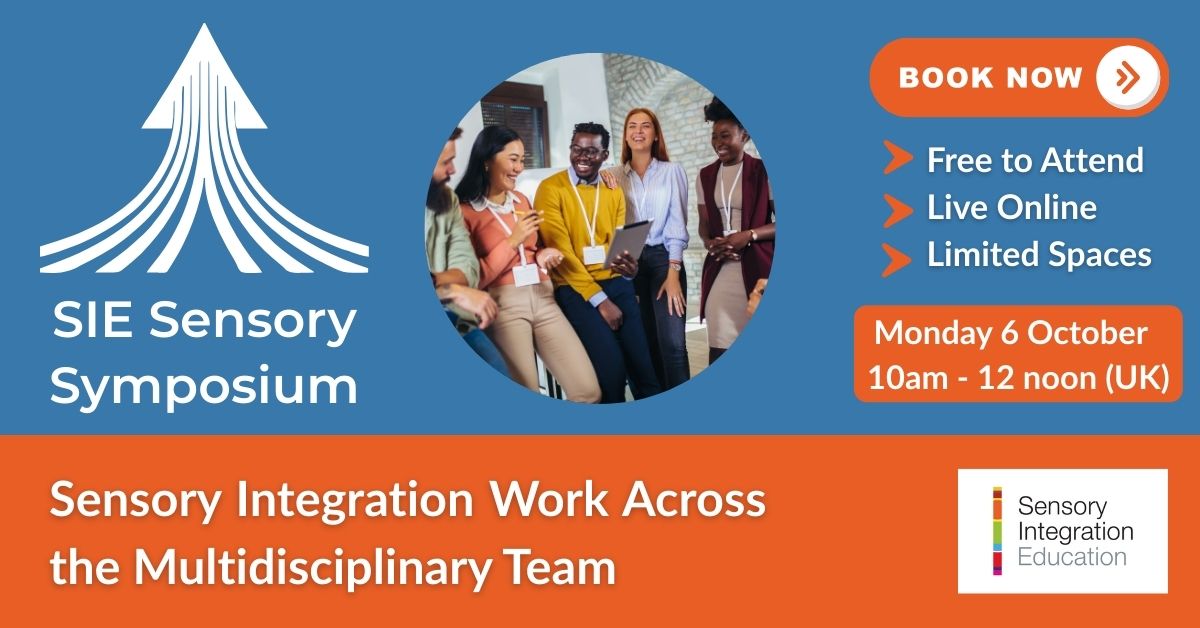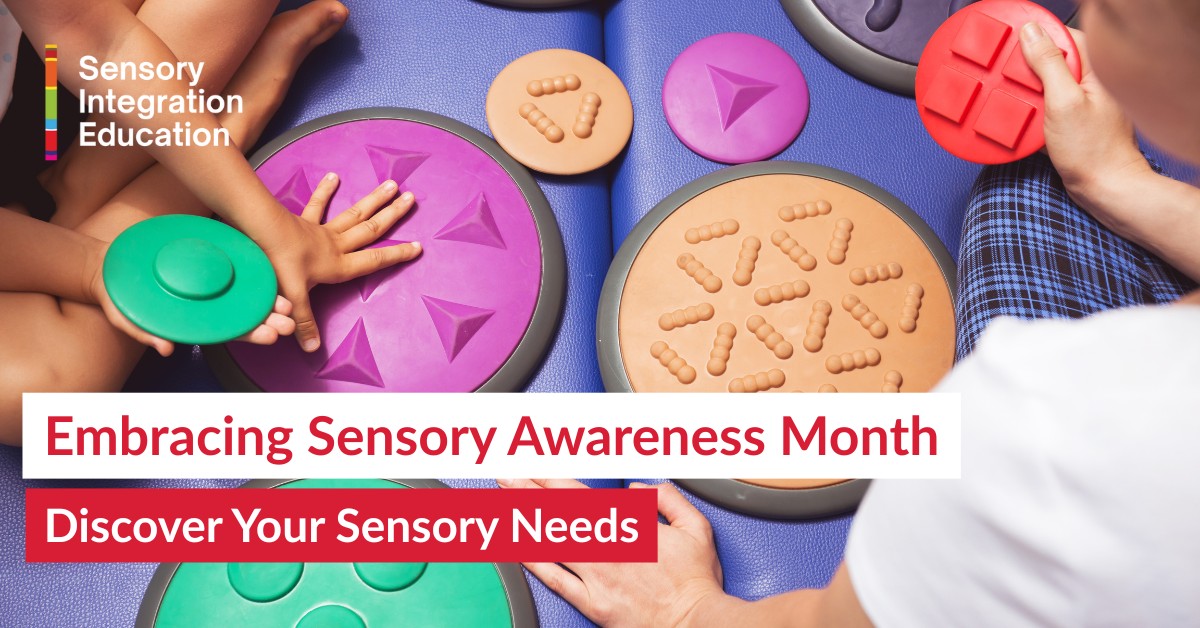EmphaSIze October 2025: Sensory Awareness
By Sensory Integration Education, 1st October 2025
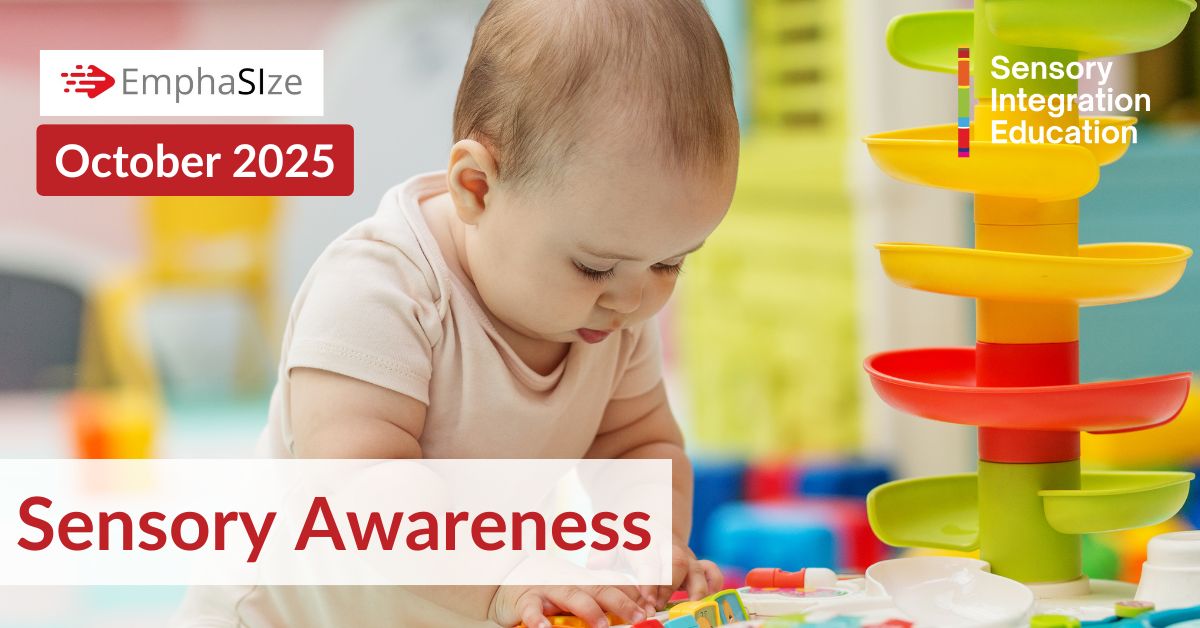
Welcome to the October issue of EmphaSIze! This month is Sensory Awareness Month which reminds us of the importance of sensory processing and integration differences.
Sensory processing is a significant part of our daily activities, encompassing essential tasks such as dressing, eating, moving, socialising, learning and working. We are all individuals and so everyone experiences differences in sensory processing. But for some individuals, these differences can make engaging in everyday tasks difficult.
In this month's issue, we've included lots of useful information, articles and resources to help raise our awareness and understanding of all things sensory.
News & Features
Last Chance to Register for next Monday's Free SIE Sensory Symposium
Next Monday (6th October), we invite you to join us for the SIE Sensory Symposium 2025: Sensory Integration Work Across the Multidisciplinary Team. This live online event brings together voices from health, education, and social care to explore how sensory informed approaches can be used safely and effectively across professions.
With a panel of expert practitioners and opportunities for attendees to contribute their own reflections, this isn’t just a conference—it’s the start of a movement towards a shared framework for sensory-informed practice. Places are free, but live access is limited to the first 500 attendees (recording available for 7 days afterwards).
Don’t miss your chance to be part of this vital conversation - book your free place today!
Embracing Sensory Awareness Month – Discover Your Sensory Needs
October marks Sensory Awareness Month, a time to reflect on how our senses shape daily life and wellbeing. Sensory awareness means recognising how we process sights, sounds, smells, tastes, textures, movement, and internal signals, which can influence our comfort, focus, coordination, emotions, and relationships.
This article looks at why Sensory Awareness Month matters and how we can all become more aware of our own sensory preferences and needs to help improve self-care, reduce stress and build more understanding environments.
Exciting News from Our Sister Site Sensory Inclusive Schools!
At Sensory Inclusive Schools, we believe that every child deserves to feel safe, supported, and ready to learn. That’s why we’ve relaunched our training and support for schools with two exciting programmes: an updated 10 Steps to Creating a Sensory Inclusive School course and our brand-new Sensory Inclusion Facilitator for Education Certificate.
Designed with busy school staff in mind, these refreshed courses provide practical, evidence-based strategies that can be easily embedded into the school week, helping primary and secondary schools build truly inclusive environments where every learner can thrive.
The Value of a Sensory Lens in Multidisciplinary Practice
In this blog, SIE’s Dr Lelanie Brewer highlights the value of bringing a sensory lens into your professional practice. She explores how by considering sensory factors, therapists can gain a more holistic understanding of the person, their daily difficulties and the reasons behind certain behaviours or reactions.
Adopting a sensory perspective does not mean sensory integration will always be the primary intervention; rather, it broadens a therapist’s approach, supports informed decision-making, and empowers individuals and families to better understand their needs and preferences.
Thoughts from a Therapist: Seasons Change, Senses React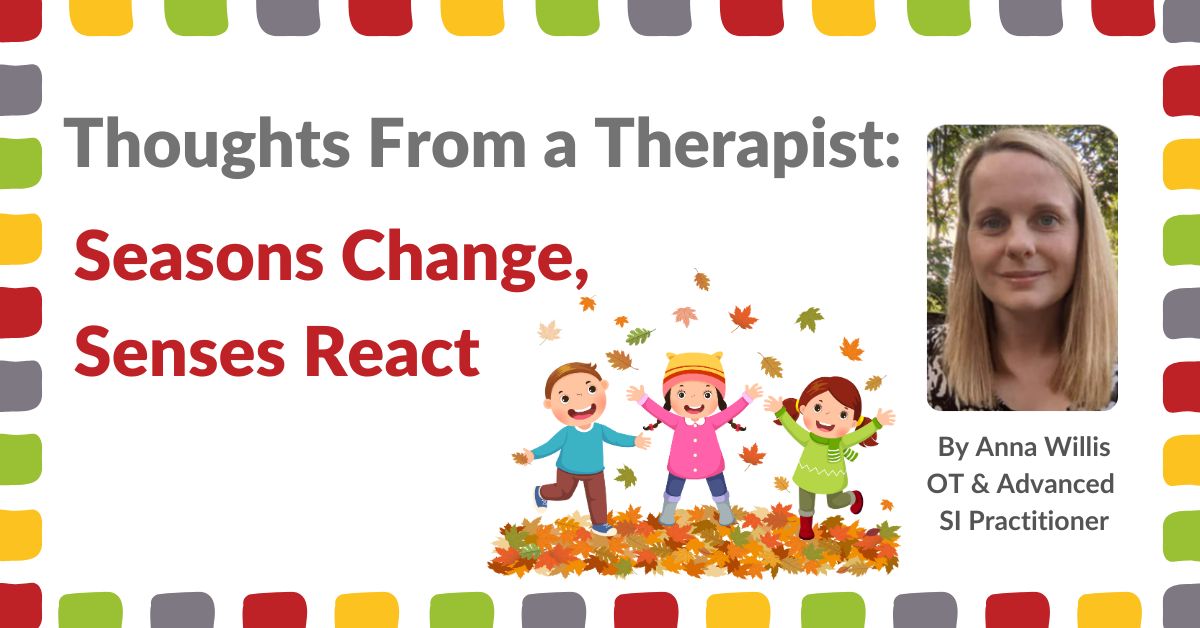
In this month’s Thoughts from a Therapist blog, Annal Willis explores the sensory challenges that seasonal changes, particularly the shift into autumn, can bring for people with sensory differences.
Her blog highlights the importance of recognising and respecting individual sensory preferences rather than dismissing them, especially in schools and therapy settings.
Check Out Our Free Course: Discover Sensory Processing and Integration
Ever wondered how sensory processing differences affect everyday life?
Our free online course ‘Discover Sensory Processing and Integration’ breaks it all down for you!
Developed by our team of highly experienced Occupational Therapists who are Advanced Practitioners in Sensory Integration, this course will help you take the first step towards a more inclusive and informed approach to sensory challenges.
What you’ll gain:
Ø An understanding of the 8 sensory systems
Ø How sensory challenges shape behaviour and experiences
Ø Downloadable ‘A Day in the Life of’ case studies across all age groups
Also see:
'There was no campsite for my autistic son, so I'm starting my own'
Rise in neurodiversity awareness sparks demand for inclusive office designs
TfL’s ‘headphones on’ campaign highlights the benefits of sensory inclusion
Sensory packs made available for rail journeys
Resources
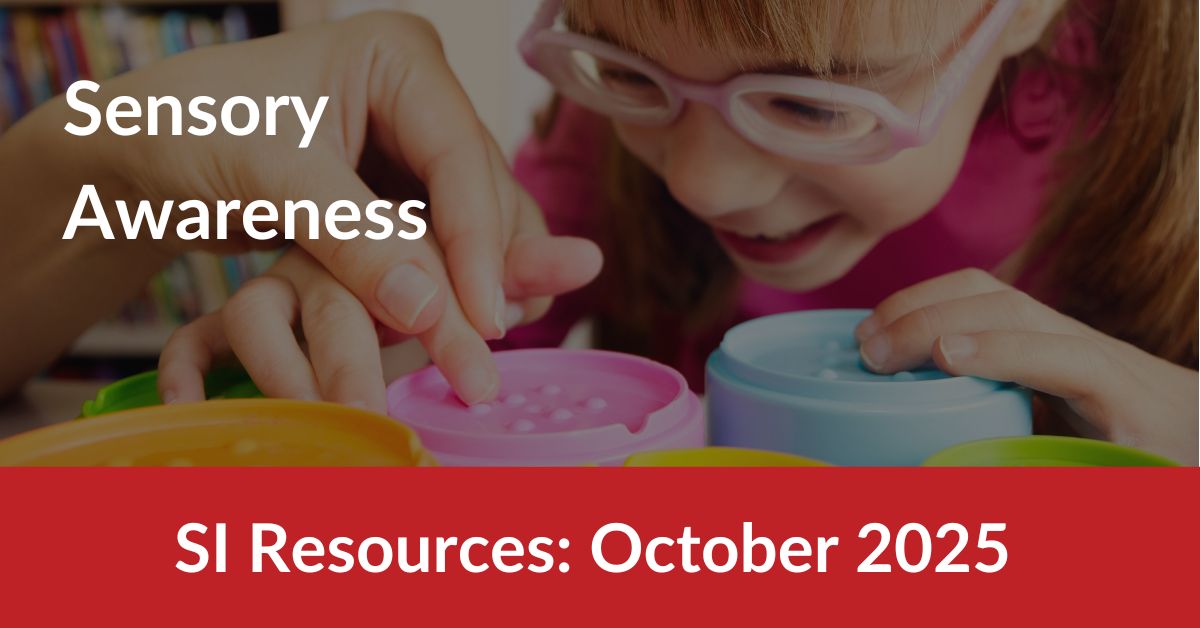
Take a look at our books and product recommendations for this month:
An Occupational Therapist’s Guide to Sensory Integration and Adult Mental Health: Written by SIE graduate and Advanced SI Practitioner Rebecca Matson, this book provides a reference manual for occupational therapists working in mental health and aiming to use a range of sensory approaches with adult patients. Structured according to diagnostic group and area of mental health, each chapter distils the relevant evidence and literature, commonly identified areas of sensory processing difficulty, ideas and approaches for that client group, and additional considerations in view of risk and health status. This book will be released on 21st October.
Halloween Without Tears: A Parent's Guide to Celebrating with Neurodivergent Kids: Written by a mother of two neurodivergent children, this book speaks directly to the frustration, guilt and isolation that many parents feel when their child can't participate in "normal" childhood experiences. The book offers practical wisdom gained from over a decade of Halloween trials and breakthroughs such as scouting neighborhoods for sensory triggers and creating backup plans that remove pressure.
Raising A Sensory-Sensitive ADHD Child: Inspired by one of the author’s children, this book is a practical science-based guide to help parents and families understand the connection between ADHD and sensory processing issues; identify a child’s sensory triggers and prevent meltdowns, how to use proven calming techniques at home, school and in public and offers up suggestions on how to sensory-friendly routines for mornings, meals, homework, and bedtime.
Weighted Therapy Turtle: This soft and cuddly weighted turtle is ideal for hugging and perfectly weighted, providing a positive sensory experience. Recommended for age 5 years +, the weight in the turtle can provide a calming effect when placed on the lap and can be used in a classroom, home setting or when travelling. Children can also carry the turtle around to help regulate the proprioceptive system.
Little Ouchies Pain Stim Fidget Toy for Adults & Teens: These are a useful sensory fidget toy for adults and teens designed to reduce stress and anxiety. Featuring a roller shape with small plastic spikes, it delivers a satisfying tactile experience that helps to calm nerves and keep hands busy and minds focused.
SI Research Digest
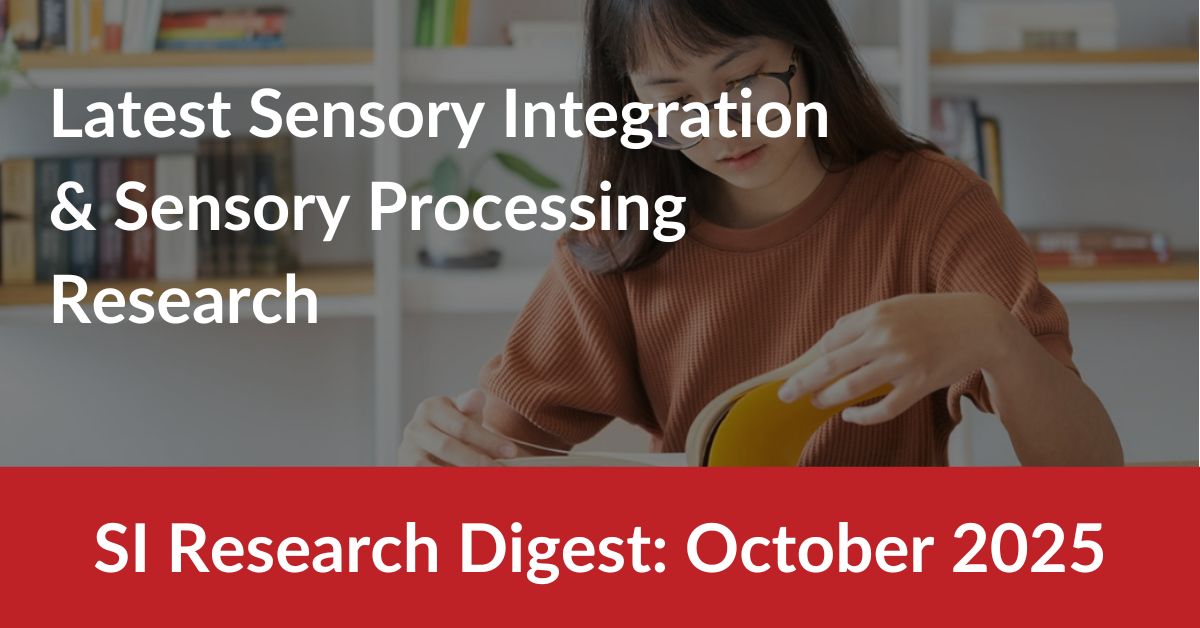
Below are links to the most popular sensory integration and sensory processing research papers and findings published on our social channels last month:
This new study analysed the data of 6,709 English children to investigate whether fine- and gross-motor skills at 18 months predicted behavioural health at 7 years of age as measured by the strengths and difficulties questionnaire (SDQ). The researchers found a significant correlation between poor fine motor skills at 18 months and low scores on the SDQ at 7 years, which includes sections on emotional difficulties, conduct problems, hyperactivity or inattention, friendships and peer groups and Pro Social behaviour.
Let’s Play: Co-designing Inclusive School Playgrounds with Neurodivergent Children
This new qualitative study, co designed with children age 10-12 years, investigated factors that make playgrounds more inclusive for neurodivergent children. The themes identified by children in the study highlight the need for affordances that offer a range of sensory experiences.
This new systematic review investigated vestibular sensory processing in individuals with schizophrenia and bipolar disorder. The researchers found distinct differences in vestibular processing in these populations. Individuals with schizophrenia presented with difficulties that impacted on postural control whilst individuals with bipolar disorder presented with vestibular changes that was associated with anxiety and comorbidity. This study highlights the need of considering vestibular function when conducting assessments in these individuals.
This new study highlights that motor difficulties are often missed by specialists working with autistic children and emphasises the importance of thorough assessments to better support them with participation in everyday tasks.
Upcoming Courses and Webinars
We have a number of live webinars that take place throughout the year covering a broad range of SI-related topics. Below is a snapshot of webinars happening over the next few months or click here to view a summary of all the upcoming live events.
All these webinars are available to you by signing up to our Lifelong Learning Programme or can be purchased as individual courses:
Ø Introduction to Sensory Integration and Yoga - 13 October 2025
Ø Using the Adult/Adolescent Sensory History (ASH) In Clinical Practice – 20 October 2025
Ø Rethinking Mental Health Through Sensory Formulation – 22 October 2025
ØThe Sensory Side of Parenting - 18 November 2025
Latest Job Listings
 Are you thinking of making a career move this year? Check out our latest job listing:
Are you thinking of making a career move this year? Check out our latest job listing:
Contractors – Paediatric Occupational Therapists with Sensory Integration Training, Parents And Children Together (PACT), Berkshire and surrounding areas, UK
Discounts & Special Offers
Please quote DISCOUNT CODE SIE20 for 10% discount on Southpaw orders up to £100. Orders must be placed by phone on +44 (0) 115 718 0020.
Would you like to receive EmphaSIze: The Sensory Integration Newsletter in your inbox? JOIN SIE FREE TODAY
Best wishes,
Sensory Integration Education
NB: Sensory Integration Education is not responsible for the content on external websites. Sharing a resource does not imply endorsement by Sensory Integration Education.


